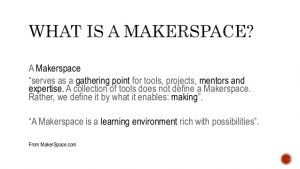That is the big question that was explored in the inquiry class today (or at least that’s what I observed). The discussion was based on the strengths, weaknesses, opportunities, and threats of a maker space, but it seemed to slowly turn into a huge battle between Maker Space vs. Trades.
From the trades point of view, they deemed maker space as not a “real” maker space; rather, they viewed maker space as a very negative area in technology education. The people with backgrounds in the trades thought that maker space was not truly a place where students make things. They viewed it as a regurgitation of previous made designs, of other people’s projects, etc. and saw it as a negative. A lot of them stated that the original industrial education that exists in school today (and in the past) still have a very important impact on students, and that these industrial spaces are needed in order to ensure that students receive the best educational tools and skills that they will need in the future.
From other maker space point of view, they thought that this maker space was a great way to integrate the industrial and design aspect of technology education. Yes, a lot the “maker space” movement has to do with computers, 3D printing, etc.; but it is a great way for students to get their hands on new innovative technology that involves not only making, but designing.
I feel that both points of view are very valid; industrial work such as woodworking, metalworking, and electronics are still very relevant in this day and age, and there is a shortage of workers in Canada in these fields. However, the maker space movement is also important in this day and age where technology is advancing very quickly. It brings a question of whether which one is more important? Or are both equally important? If both are important to students, how do we balance the two different areas in a secondary school setting? I think that these questions are interesting questions that we can explore in future inquiry classes.

